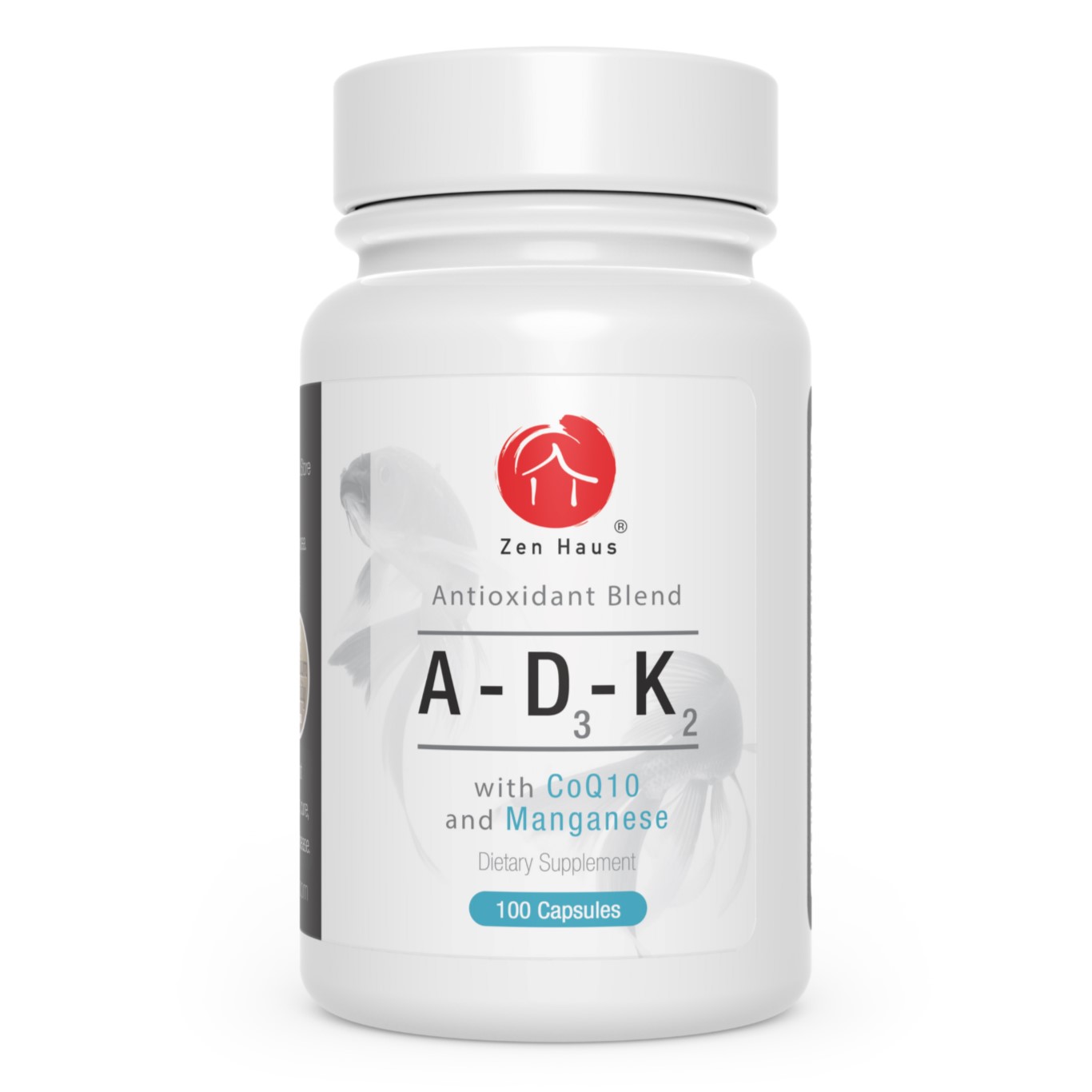Vitamin A
Vitamin A is a group of unsaturated nutritional organic compounds that includes retinol, retinal, retinoic acid, and several provitamin A carotenoids including beta-carotene. It is important for growth and development, for the maintenance of the immune system and good vision. Vitamin A is used in the retina of the eye in the form of retinal. It is a fat soluble vitamin essential for normal vision, as well as proper bone growth, healthy skin, and protection of the mucous membranes in the digestive, respiratory, and urinary tracts.
Vitamin A helps neutralize free radicals in the body that cause tissue and cellular damage. Its antioxidant properties support gene regulation, facilitating cell differentiation, supporting immune function, strengthening teeth, and maintaining healthy clear skin. Vitamin A is also needed to form glycoproteins, a combination of sugar and protein, which help the cells bind together forming soft tissues.
In foods of animal origin the major form of Vitamin A is retinyl palmitate. It is converted to retinol in the small intestine and can be stored in this form. Retinol can be converted to and from the visually active retinal form.
Sources of Deficiency
Sources of retinol, the active form of Vit-A, include eggs, butter, cheese, cod liver oil and liver. We also get Vitamin A from inactive sources and this needs to be converted to the active form in the body. Sources of inactive Vitamin A include carrots, kales, spinach and greens.
Deficiency may be caused by consuming insufficient amounts of sources of the active form, as well as the inability to convert the inactive form. One reason for poor conversion of the inactive form is low bile production from the gallbladder. A common reason for low bile production is weak stomach acid. Issues relating to bile production will need to be addressed in order to get the Vit-A benefits from inactive sources.
Signs of Deficiency
Vitamin A deficiency may be seen with symptoms in the eyes, skin and poor immune function.
In the eyes we may experience night blindness, discomfort from sunlight, slow adjustment between bright and dark environments and the occurrences of sties (a pimple on the inside of the eyelid).
In the skin we may experience dry skin, clogged pores, and strong odors from armpits and feet. Vit-A is required to keep skin and pores moist and lubricated which is needed to help release toxins and bacteria. When the skin and pores are too dry these toxins and bacteria become trapped and cause strong odors.
We may also experience poor immune function and see an increase in infections in the respiratory, kidney, eyes, middle ear, sinus, intestines and reproductive organs.
Insomnia and fatigue are also symptoms of Vitamin A deficiency.
Benefits
Vitamin A supports the immune system, vision, skin, teeth, urinary tract and prostate cancer.
Immune
Several immune system functions depend on Vitamin A. Genes involved in immune responses are regulated by Vitamin A.1 It is essential for preventing serious conditions like cancer and autoimmune diseases, but also common illnesses like the flu or common colds. Vit-A ensures better immunity by keeping mucus membranes moist. This also enhances the activity of white blood cells.
Vision

Moisture in eye cells are very important to proper functioning of the eye. Vitamin A helps to maintain moisture in the eye cells. It also helps protect the surface of the eye. When using your eyes you are also using up Vit-A and so it must be replenished regularly. Early research has demonstrated that Vit-A supplementation can reverse the effects of night blindness.
A cataract is when the lens of the eye gets cloudy. Cataracts can cause shortsightedness. Moderate levels of Vitamin A in patients’ diets were connected to a 40% lower risk of cataracts.3,4
Glaucoma is an eye disease caused by increased pressure in the eye which damages the optic nerve. It is the leading cause of irreversible blindness in the world. Vit-A works against glaucoma by reducing oxidative stress in eye tissues.4
Vitamin A works against retinitis pigmentosa, a genetic disorder of the eyes that causes loss of vision.5
Vitamin A also works against Stargardt’s disease which is associated with progressive vision loss.6
Skin
Vitamin A is necessary for wound healing and skin regrowth. It is needed to support all of the epithelial (skin) cells both internally and externally and is a powerful aid in fighting skin cancer.7 Vit-A reduces lines and wrinkles in the skin by producing more collagen, which is responsible for keeping the skin looking young.8 It can also contribute to healthy hair.
Vitamin A deficiency will lead to the drying, scaling, and follicular thickening of the skin. Deficiency can lead to a poor complexion, as indicated by studies that prove that Vitamin A can fight acne and improve overall skin health.9
Vitamin A helps to cut down excess production of oils that lubricate and waterproof the skin and hair. This reduces the risk and severity of acne. Vitamin A also reinforces protective tissues of the skin, thereby enhancing the overall health and vitality of the skin surface. It is also essential for the proper maintenance of the skin tissues and mucous membranes. It flushes out the toxins from your body and helps cleanse the system like an antioxidant.
Teeth
This essential vitamin strengthens our teeth. Vitamin A helps in the formation of dentin which is a layer of hard material just below the surface of the teeth.
Calcium Stones
Vitamin A prevents the formation of solid calcium particles in the urinary tract. It also helps keep the lining of the urinary tract in shape, thereby reducing the chance of calcium stones.
Prostate Cancer
Vitamin A seems to aid in the use of dietary protein. Androgens typically promote prostate cancer. However, Vit-A both boosts androgen production while also strongly inhibiting prostate cancer. Vitamin A and its natural and synthetic analogs, called retinoids, bring about the death of prostate cancer cells.10 Retinoic acid is a chemical made from Vitamin A. It can turn specific genes within prostate cancer stem cells back on, reducing the ability of the cancer to invade surrounding tissue.11 The findings suggest that Vit-A related compounds could be used to enhance clinical treatments for prostate cancer.
Summary
Vitamin A has antioxidant properties which helps neutralize free radicals in the body that can cause tissue and cellular damage. It is also important for growth and development, for the maintenance of the immune system and good vision. Moreover, Vitamin A supports gene regulation, facilitating cell differentiation, strengthening teeth, and maintaining healthy clear skin. It also protects against environmental toxins and free radical damage. Vitamin A deficiency may be recognized by health issues pertaining to these areas. Deficiency is caused by consuming insufficient amounts of sources of the active and inactive forms, as well as the body’s inability to convert the inactive form.
Vitamin A works well with Vitamin D and so we have combined them in the Zen Haus ADK Supplement. Learn more about the Vitamin A and Vitamin D synergies in the ADK Synergies post.
.
.


